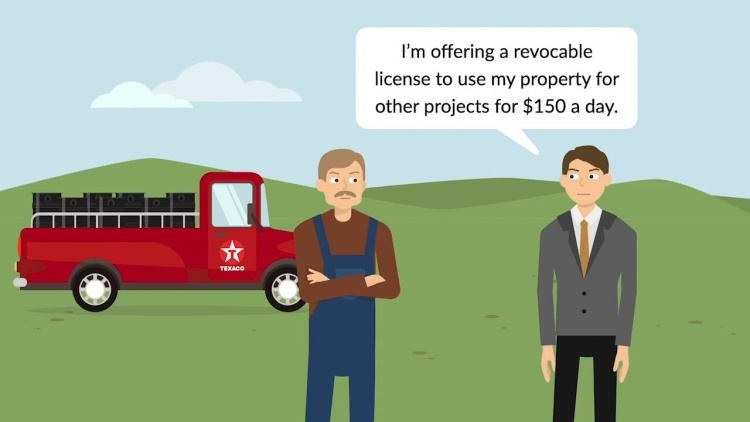Russell v. Texas Co.
United States Court of Appeals, Ninth Circuit
238 F.2d 636 (1956)
- Written by Megan Petersen, JD
Facts
Russell (plaintiff) owned a piece of land called section 23. The previous owners of section 23 acquired the property from the Northern Pacific Railway Company (Northern Pacific) (defendant). Northern Pacific executed a warranty deed reserving mineral rights in the property. Northern Pacific also granted a gas lease on section 23 to the Texas Co. (Texas) (defendant). Texas conducted extensive operations on section 23 pursuant to its oil and gas lease, and also used the surface of section 23 in conjunction with its operations on adjacent lands. Texas’ use of the surface of section 23 was without permission and in excess of its rights under the oil and gas lease. On October 30, 1952, Russell offered a revocable license to Texas which granted Texas the right to use the surface of section 23 for a fee of $150 per day. Russell’s offer provided that acceptance of the offer could be given by continued use of the surface of section 23. Texas continued to use the surface of section 23 until November 22, 1952. Texas notified Russell in December that it rejected Russell’s offer for the revocable license. Russell brought suit against Texas seeking damages for its use of the surface of section 23 in conjunction with its operations on adjacent lands. The trial court held for Russell and awarded $3,837.60 in damages. $3,600.00 of this was held to be owed by Texas to Russell under the revocable license, and $237.60 was held to be due under the terms of the original oil and gas lease. Texas appealed the $3,600.00 award, arguing that it never accepted Russell’s offer and thus no contract existed. Russell appealed the award of $237.60, claiming the court applied the wrong rule of damages.
Rule of Law
Issue
Holding and Reasoning (Halbert, J.)
What to do next…
Here's why 906,000 law students have relied on our case briefs:
- Written by law professors and practitioners, not other law students. 47,100 briefs, keyed to 995 casebooks. Top-notch customer support.
- The right amount of information, includes the facts, issues, rule of law, holding and reasoning, and any concurrences and dissents.
- Access in your classes, works on your mobile and tablet. Massive library of related video lessons and high quality multiple-choice questions.
- Easy to use, uniform format for every case brief. Written in plain English, not in legalese. Our briefs summarize and simplify; they don’t just repeat the court’s language.





